Plastic bottles are the most prevalent form of plastic pollution and is a growing threat for the environment.
Shivanand Hongal, a professor in the College of Horticulture, Sirsi in Karnataka on his trip to Israel found a brilliant, affordable and eco-friendly way to upcycle the plastic water bottles. He saw a farmer grow ornamental plants in waste plastic bottles. He shared the idea with college management and students and received a positive response.
In May this year, students started collecting plastic bottles from the campus and their neighbourhood. A total of 700 non-biodegradable bottles were collected. They watched a lot of DIY videos on YouTube to get the right technique of cutting the bottles. After a few trials and errors, they got it right.
The bottles cut sideways were used for leafy vegetables like coriander, neem, spinach, and the ones with vertical cuts for plants like onion, garlic, radish, among others.
The students were divided into groups, and each team was given a specific location to hang the upcycled bottles.
Soil was replaced with coco peat as it is lighter and some amount of organic fertilizer was added to ensure that the plants got the required nutrients. As these seeds were planted on the onset of monsoon, the yield was quite excellent.
The success and satisfaction derived from this project even motivated the college to go beyond bottles and upcycle as many non-biodegradable waste as possible.
The students and teachers are now reusing plastic bags, waste cement bags, wooden planks, old tyres, oil cans, paint boxes, buckets and other waste items to grow flowers, fruits and a variety of vegetables like cucurbits, legumes, leafy vegetables, root vegetables etc. The college has 150 waste tyres, cans and boxes, 700 plastic bottles, 200 grow bags and wooden plank sheets on campus.
Over the past six months, college students have involved themselves in experimenting with a new technology which involves low investment, less water and no soil, to cultivate organic vegetables for healthy meals. The students spend less than an hour a day on this garden and also experiment with new vegetables, besides making use of waste and plastic bottles.
Big changes always begin by taking a single step and there is power in small steps. We all can upcycle and repurposing old and discarded items into new products that have a better quality and an environmental value. Read more about how to upcycle here
This post is part of the We Are the World Blogfest, a monthly blogging event created by Damyanti Biswas and Belinda Witzenhausen to showcase stories of hope and light. This month, I’m helping out as a co-host, along with extraordinary bloggers : Sylvia Stein, Eric Lahti and Lizbeth Hartz. Please hop over to check out their WATWB posts as well as from other WATWB participants for a dose of feel-good to last you a whole month. You’ll be happy you did!
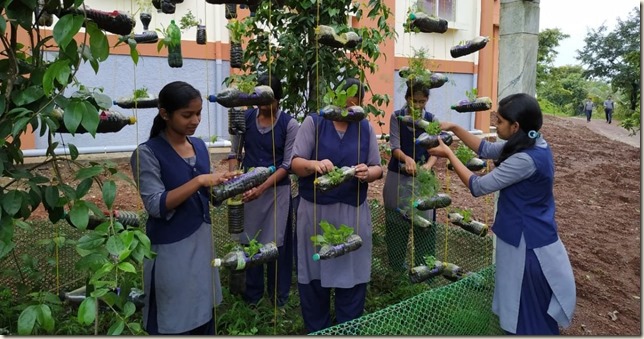
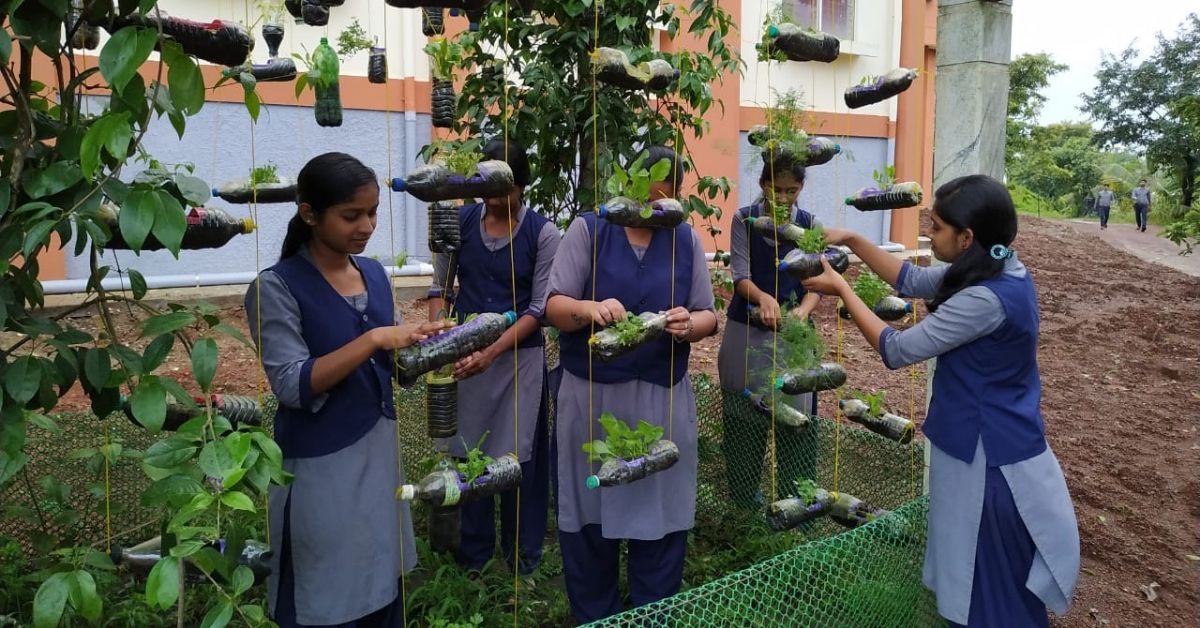
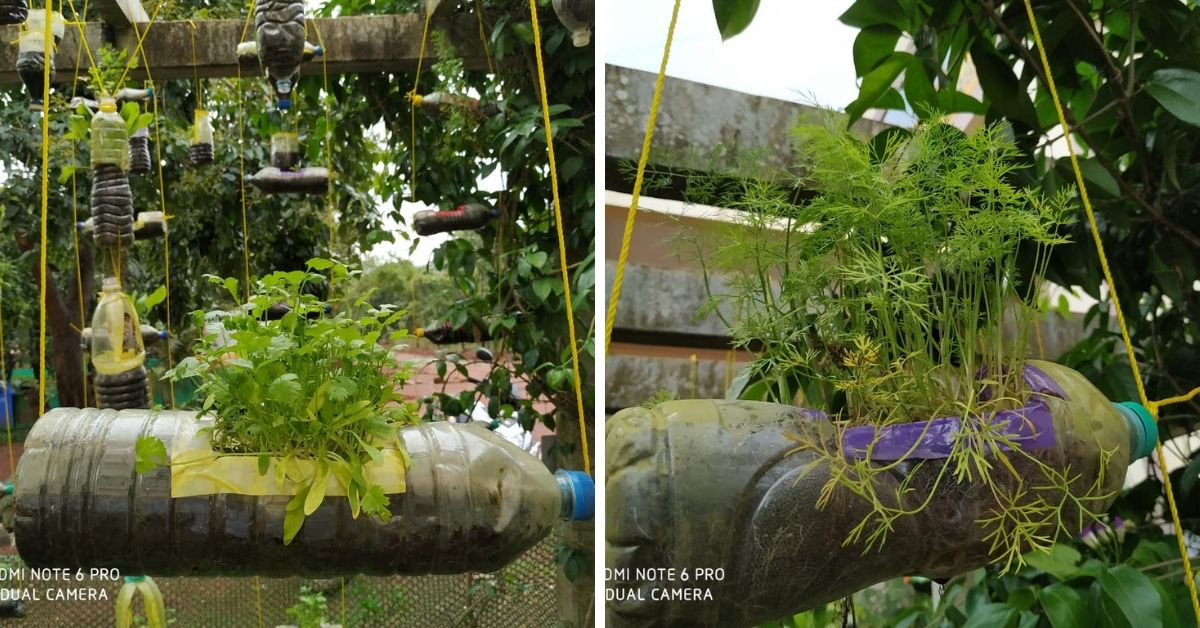
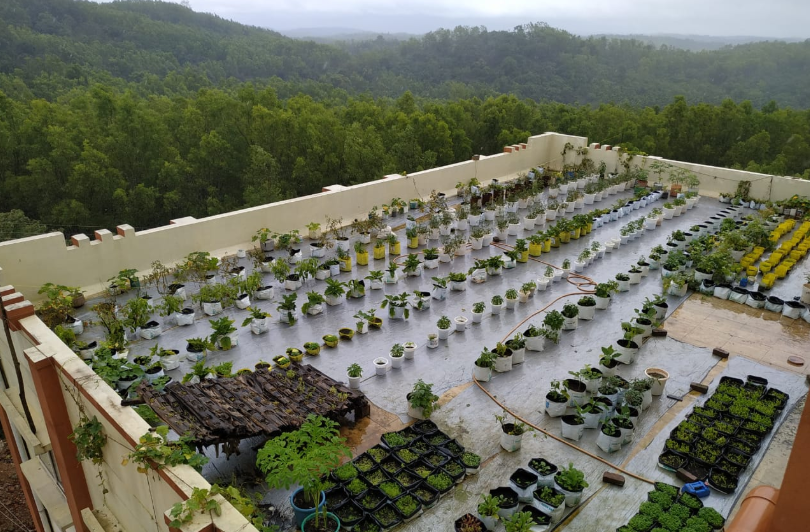
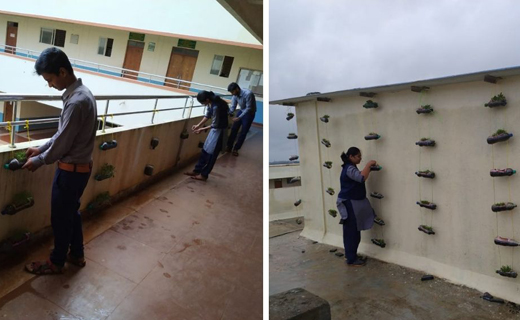

so fabulous Shilpa thank you – we can learn so much in how to turn trash into gold 🙂
What a wonderful initiative taken up by the professor and excecuted so well by the students! Feel so happy and proud such initiatives taking root in our country. I hope this movement goes viral, becomes a revolution. Thanks for sharing this Shilpa.
This is ingenious! If it turns into a worldwide movement, it should go a long way towards eliminating plastic waste.
This is cool.
So nice to know Shilpa , there’s so much students can do when they are guided, hats off to the institution that gave them the freedom and space to experiment. Thanks for sharing.
A fantastic idea to reuse plastic bottles and cement bags to grow plants.
These students really thought outside the box which we all need to do when it comes to upcycling and re-purposing what we have thought of as “waste.” I was impressed by how they used so many surfaces like walls and the roof. Great post!
What a great thing to do, reduce our carbon footprint by repurposing and upcycling! And the new creations are beautiful as well as useful. I was inspired to read this and blown away by where people’s creativity takes them! Thanks for sharing these great articles!
This is such a great initiative and I believe such small things make a huge difference..
Wow! That’s a fantastic initiative and so impactful. I hope they make it into a tradition and keep it alive. Reading your article made me very happy.
Grea idea, my mother in law also uses large cold drink bottles for planting small plants.
What a wonderful and innovative initiative undertaken by students. kudos to their efforts. This is such a positive blog.
We have to start and teach them young. This initiative by teachers and children is so praiseworthy. Today we all know that recycling is so important. Small steps will result in big better changes.
Wow that is such a wonderful idea!! More people should be inspired by this wonderful undertaking.
Hey this is cool. I am from Sirsi. Will definitely try and meet these students and professors during my next visit.
Now this is such an eye opening initiative by the college and its students. I wish more and more people can come up with equally environment friendly initiatives.
Considering the present day Aarey condition, I am sure this is definately a need of the hour
That is such an amazing initiative by Karnataka college to upcycle 700 bottles into hanging garden. This is huge! My mom also has a small terrace garden where she has made use of plastic bottles to make planters, I had just shared it in my stories today. Ideas should spread!
This college is truly setting an example for all of us to recycle things in benefit of environment.
This is so cool! What is even more commendable is that the younger generation is taking efforts to reduce and reuse plastic waste. I’ve used bottles, tubs and other containers as planters too.
Wow that’s awesome I really like this initiative taken by the professor and students are equally supporting this cause and helping nature by this.
This is an amazing initiative by the college to recycle and reduce environmental pollution.
This is inspiring!